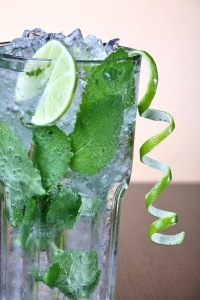It’s brutally hot and you’re sweating like a pig. Was your run really a good idea? Need something to drink – but what – water, Gatorade, Red Bull, Powerade? Do you need just water or water plus other stuff?
Designed To Hydrate
Sports drinks, a combination of fluids, carbs, sodium and potassium are designed to replenish fluids and nutrients lost through sweating during exercise. If you work out for more than an hour, or for very intensely for less than an hour they are the ideal during- and after-activity hydration drink. But, if your workout is of short duration or is low-intensity. a sports drink may not be your best choice. If you’re just going for a brisk 20 minute walk or doing some other short or low intensity activity, water may be your best choice.
What’s In Them That You Probably Don’t Need For Less Intense Workouts
Two Things: sugar and sodium.
Sugar is a prominent ingredient because it’s a good way feed carbs to your working muscles. But, its an extra two to five teaspoons of added sugar you’re putting into your body for each 8 oz serving. Remember — most bottles contain at least double that amount, so double up on the sugar count, too. The American Heart Association’s recommendation is to limit added sugars to no more than half of your daily discretionary calories allowance which translates to no more than 100 calories per day, or about 6 teaspoons of sugar for most American women and150 calories per day, or about 9 teaspoons, for men.
Although sodium is helpful for higher levels of activity, most of us don’t need to add extra sodium to add to already high sodium intakes.
Don’t Confuse Energy Drinks And Sports Drinks
Energy drinks have a boost of caffeine which research says might enhance athletic performance. Because they have the caffeine equivalent of a cup of coffee, energy drinks like Rockstar, Monster, and Red Bull are also popular as everyday drinks.
Sports drinks generally have fewer calories because they generally have less sugar than energy drinks. They do have sodium to help replenish what you’ve sweated out, and generally no caffeine. Some sports drinks, called recovery sports drinks, have protein and may be marketed as recovery sports drinks. Use them when your activity lasts longer than 6 hours.
When Are Sports Drinks Helpful?
If you exercise at a high intensity for 60 minutes or more, fluids that supply 60 to 100 calories in 8 ounces help supply the calories necessary calories for continuous performance. During normal training it’s not necessary to replace sodium, potassium and other electrolytes you lose during exercise. But, if you exercise in extreme conditions over 3 or 5 hours — like during a marathon or a triathalon — you might think about drinking a sports drink with electrolytes.
SocialDieter Tip:
If you are exercising for over an hour or you’re really busting your butt for a shorter but more intense workout, think about a sports drink for hydration. Here are some examples of drinks along with their calories, carbs, sugars, sodium, and potassium. If your exercise time is short or not too strenuous, stick with good old fashioned water.
- Powerade, Grape, 8 oz,, 50 calories, 14g sugars, 14 carbs,100mg Sodium, 25 mg Potassium
- Gatorade G Berry, 8 oz , 80 calories, 21g sugars, 21 carbs, 160 mg Sodium, 45 mg Potassium
- Propel Kiwi-Strawberry, 8 oz, 10 calories, 2g sugars, 2g carbs, 75 mg Sodium, 20 mg Potassium
- Gatorade G2 Perform Low Calorie Orange, 8 oz, 20 calories, 5 g sugars, 5g carbs, 110mg Sodium, 30 mg Potassium
- Sobe Lifewater 0 calories Black & Blue Berry, 8 oz, 0 calories, 6g carbs, 0g sugars, 25 mg Sodium, n/a Potassium
- Red Bull Energy Drink, 8.4 oz, 110 calories, 28g carbs, 27g sugars, 100mg Sodium, n/a Potassium


Hello there.. I am very new to blogging globe and that i already been doing some searching to get ideas. Your wp weblog definitely has help me. Appreciate that!